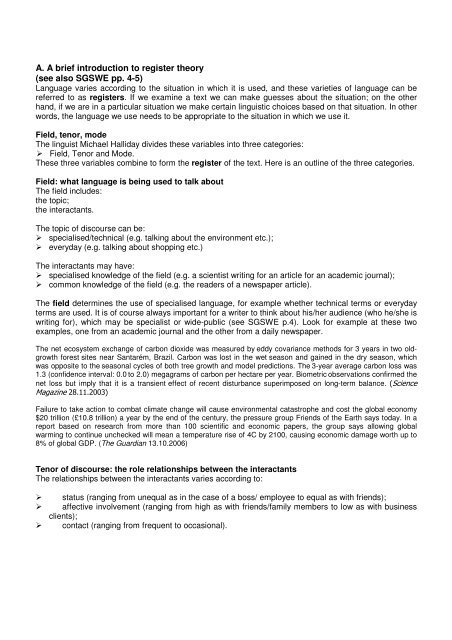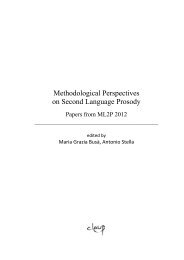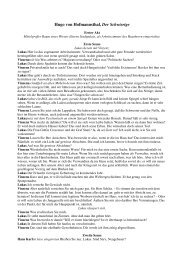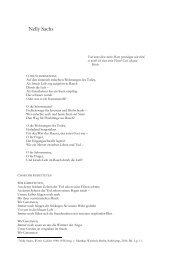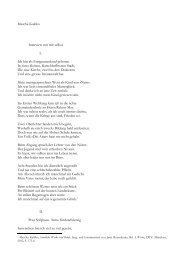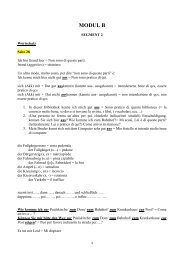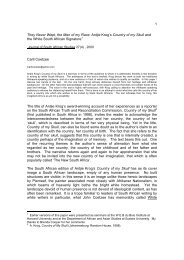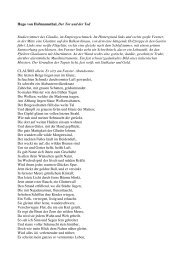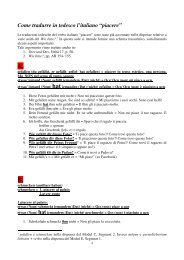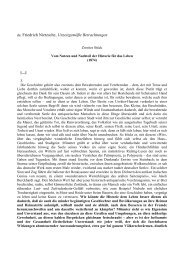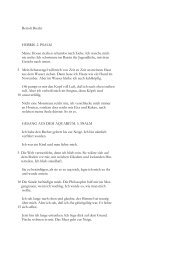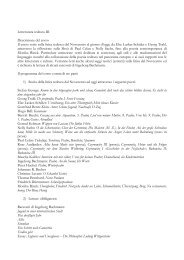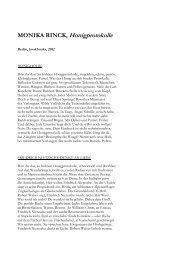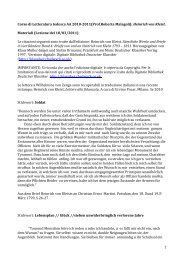A. A brief introduction to register theory (see also SGSWE pp. 4-5)
A. A brief introduction to register theory (see also SGSWE pp. 4-5)
A. A brief introduction to register theory (see also SGSWE pp. 4-5)
You also want an ePaper? Increase the reach of your titles
YUMPU automatically turns print PDFs into web optimized ePapers that Google loves.
A. A <strong>brief</strong> <strong>introduction</strong> <strong>to</strong> <strong>register</strong> <strong>theory</strong><br />
(<strong>see</strong> <strong>also</strong> <strong>SGSWE</strong> <strong>pp</strong>. 4-5)<br />
Language varies according <strong>to</strong> the situation in which it is used, and these varieties of language can be<br />
referred <strong>to</strong> as <strong>register</strong>s. If we examine a text we can make guesses about the situation; on the other<br />
hand, if we are in a particular situation we make certain linguistic choices based on that situation. In other<br />
words, the language we use needs <strong>to</strong> be a<strong>pp</strong>ropriate <strong>to</strong> the situation in which we use it.<br />
Field, tenor, mode<br />
The linguist Michael Halliday divides these variables in<strong>to</strong> three categories:<br />
Field, Tenor and Mode.<br />
These three variables combine <strong>to</strong> form the <strong>register</strong> of the text. Here is an outline of the three categories.<br />
Field: what language is being used <strong>to</strong> talk about<br />
The field includes:<br />
the <strong>to</strong>pic;<br />
the interactants.<br />
The <strong>to</strong>pic of discourse can be:<br />
specialised/technical (e.g. talking about the environment etc.);<br />
everyday (e.g. talking about sho<strong>pp</strong>ing etc.)<br />
The interactants may have:<br />
specialised knowledge of the field (e.g. a scientist writing for an article for an academic journal);<br />
common knowledge of the field (e.g. the readers of a newspaper article).<br />
The field determines the use of specialised language, for example whether technical terms or everyday<br />
terms are used. It is of course always important for a writer <strong>to</strong> think about his/her audience (who he/she is<br />
writing for), which may be specialist or wide-public (<strong>see</strong> <strong>SGSWE</strong> p.4). Look for example at these two<br />
examples, one from an academic journal and the other from a daily newspaper.<br />
The net ecosystem exchange of carbon dioxide was measured by eddy covariance methods for 3 years in two oldgrowth<br />
forest sites near Santarém, Brazil. Carbon was lost in the wet season and gained in the dry season, which<br />
was o<strong>pp</strong>osite <strong>to</strong> the seasonal cycles of both tree growth and model predictions. The 3-year average carbon loss was<br />
1.3 (confidence interval: 0.0 <strong>to</strong> 2.0) megagrams of carbon per hectare per year. Biometric observations confirmed the<br />
net loss but imply that it is a transient effect of recent disturbance superimposed on long-term balance. <br />
<br />
Failure <strong>to</strong> take action <strong>to</strong> combat climate change will cause environmental catastrophe and cost the global economy<br />
$20 trillion (£10.8 trillion) a year by the end of the century, the pressure group Friends of the Earth says <strong>to</strong>day. In a<br />
report based on research from more than 100 scientific and economic papers, the group says allowing global<br />
warming <strong>to</strong> continue unchecked will mean a temperature rise of 4C by 2100, causing economic damage worth up <strong>to</strong><br />
8% of global GDP. (The Guardian 13.10.2006)<br />
Tenor of discourse: the role relationships between the interactants<br />
The relationships between the interactants varies according <strong>to</strong>:<br />
status (ranging from unequal as in the case of a boss/ employee <strong>to</strong> equal as with friends);<br />
affective involvement (ranging from high as with friends/family members <strong>to</strong> low as with business<br />
clients);<br />
contact (ranging from frequent <strong>to</strong> occasional).
The relationship between interactants influences the formality of the language used (<strong>see</strong> section<br />
“Language differences between <strong>register</strong>s”). Look for example at these two examples of emails, one from a<br />
seminar organiser <strong>to</strong> a participant (unequal status; low affective involvement; occasional contact) and the<br />
other from a family member (equal status; high affective involvement; frequent contact).<br />
We are very pleased <strong>to</strong> hear that you have been a<strong>pp</strong>ointed <strong>to</strong> represent CercleS at the 7th ELP Seminar in Vilnius,<br />
Lithuania.<br />
I would be very grateful if you could let me have your full postal address so that we can send you a signed<br />
invitation. In the meantime, please find attached the draft programme and other documents concerning the seminar.<br />
HIIII!! thanks sooo much for sponsoring me. im very very grateful. how are things?<br />
so you can probably tell from the late reply of this email that i havent really got myself organised, though i have just<br />
sent off my accommodation a<strong>pp</strong>lication form for southamp<strong>to</strong>n uni..ooo exciting. ive just recovered from <strong>to</strong>nsillitis<br />
which wasnt fun but im ok now and thats all that matters. any news in italy? not in italy generally, i could look that up<br />
on the net if i wanted i mean any news with you?<br />
Mode of discourse: the role language is playing in the interaction<br />
Language can be:<br />
written;<br />
spoken;<br />
written <strong>to</strong> be spoken (e.g. a political speech).<br />
Language can be:<br />
spontaneous (e.g. conversation);<br />
planned (e.g. a composition or article).<br />
The level of interactiveness of language varies. There can be the possibility of having:<br />
immediate feedback (e.g. conversation);<br />
rapid feedback (e.g. emails);<br />
delayed feedback (e.g. letters).<br />
Language can:<br />
accompany an action (e.g. saying those while pointing <strong>to</strong> something);<br />
describe an experience (e.g. a news report).<br />
Conversation is spontaneous, interactive and often accompanies actions. The language of conversation is<br />
characterized by:<br />
hesitations, interruptions etc.;<br />
interrogatives and imperatives;<br />
ellipsis (omitting words/phrases because they are clear from the context);<br />
use of the pronouns I, you, we;<br />
low frequency of nouns (low lexical density - <strong>SGSWE</strong> p. 19).<br />
Look at this extract from a conversation between two students.<br />
A: What are you doing this summer? Are you going <strong>to</strong> the beach? Are you going <strong>to</strong> the mountains? Or...?<br />
B: Possibly, yeah. I want <strong>to</strong> do some traveling. Um, I may go up <strong>to</strong> Switzerland and visit a friend – check out the<br />
mountains there. Probably – I’ll definitely hit the beach. Uh, I really wanna try and make it over <strong>to</strong> Eastern Europe. I<br />
wanna go <strong>see</strong> Romania. Even bought myself a little Romanian dictionary – I’m all set.<br />
A: Wow.<br />
Formality/informality v. Written/spoken<br />
A great deal of spoken language is informal; the interactants are of equal status and have a close<br />
affective involvement e.g. conversation between friends. On the other hand, written language is often<br />
formal (the interactants do not know each other e.g. academic prose). Yet there is <strong>also</strong> formal spoken<br />
language and informal written language.
formal spoken language (e.g. conversation between people of unequal status; speeches)<br />
Look at these examples:<br />
I <strong>see</strong>. Um, good, Mr. Hutchinson. It was very pleasant interviewing you and we’ll let you know of our decision. I<br />
think we can wind up now. We’ll let you know of our decision as soon as I’ve decided the matters <strong>to</strong>gether with the<br />
committee. You’ll be hearing from us. (taken from a job interview).<br />
For <strong>to</strong>o long, the citizens of the Middle East have lived in the midst of death and fear. The hatred of a few holds the<br />
hopes of many hostage. The forces of extremism and terror are attempting <strong>to</strong> kill progress and peace by killing the<br />
innocent. And this casts a dark shadow over an entire region. For the sake of all humanity, things must change in<br />
the Middle East. (taken from a political speech, Bush, 25.06.2002)<br />
informal written language<br />
(e-mails/letters between friends; some writers for popular newspapers/magazines/websites use a very<br />
informal <strong>register</strong> <strong>to</strong> create a “friendly” relationship with their readers)<br />
TAKE a long look at these amazing creatures—because it could be your last chance.<br />
For a shocking new report carried out by experts from around the globe has found that up <strong>to</strong> 60,000 species are<br />
becoming extinct EVERY YEAR.<br />
The main culprits? Man and spi-ralling climate change, which <strong>to</strong>gether have had a devastating impact on the<br />
innocent residents of our planet. (News of the World 22.10.2007)<br />
Bibliography<br />
Eggins, S. (2004) An Introduction <strong>to</strong> Systemic Functional Linguistics, 2nd Edition, New York/London,<br />
Continuum.<br />
Halliday M.A.K. and Hasan R. (1989) Language, Context, and Text: Aspects of Language in a Socialsemiotic<br />
Perspective, Oxford, Oxford University Press.<br />
B. Language differences between <strong>register</strong>s<br />
Grammar<br />
1. The quantifiers a lot of/lots of/loads of are associated with informal language, whereas much/a great<br />
deal of (+ uncountable) and many/a great many (+ countable) are more formal.<br />
See <strong>SGSWE</strong> <strong>pp</strong>. 63 and 75.<br />
Examples:<br />
There were a lot/lots/loads of people… (informal)<br />
Much/a great deal of crime goes unreported. (formal)<br />
Many/a great many people had avoided the delays … (formal)<br />
2. The contracted forms of auxiliary verbs (you’re, I’ll etc.) are often used in spoken English (<strong>SGSWE</strong> p.<br />
27) and informal written English e.g. informal letters and e-mails. Negative contraction (it wasn’t, you<br />
shouldn’t etc.) are nearly always used in spoken English and informal written English, but rarely in formal<br />
written <strong>register</strong>s such as academic prose. See the figure on p. 242 of <strong>SGSWE</strong>.<br />
3. Negation with no is very rare in conversation (informal spoken language), which prefers negative + any.<br />
See <strong>SGSWE</strong> p. 245.<br />
Examples:<br />
They had no sympathy for him.(formal written)<br />
They didn’t have any sympathy for him. (spoken)<br />
4. Going <strong>to</strong> for future prediction is rare in formal written <strong>register</strong>s such as academic prose.<br />
Examples:<br />
... it will run out of kinesic energy … (ACAD)<br />
«It’s going <strong>to</strong> be hard <strong>to</strong> convince him» (CONV)
5. Passives are common in formal written <strong>register</strong>s such as academic prose and newspapers but rare in<br />
spoken language. <strong>SGSWE</strong> <strong>pp</strong>. 167-169.<br />
Example:<br />
Saddam was seized on Saturday night in a rudimentary hiding place dug in<strong>to</strong> the earth on the modest<br />
farm of his former cook, close by the village of al Ouja where he was born 66 years ago. The dramatic<br />
news was announced <strong>to</strong> the world by Paul Bremer, the Americans'chief administra<strong>to</strong>r in Iraq.<br />
"Ladies and gentlemen, we got him," he said.<br />
(The Guardian, 15.12.2003)<br />
See <strong>also</strong> Cutting Edge Module 4<br />
6. The relative pronoun that is the most common in conversation, who is the most common in newspapers<br />
and which in academic prose.<br />
<strong>SGSWE</strong> <strong>pp</strong>. 285/6.<br />
Examples:<br />
the car that was going past (CONV)<br />
the girl that lives down the road (CONV)<br />
a woman who has been missing for weeks (NEWS)<br />
the ratio which will give an acceptable performance (ACAD)<br />
7. Academic prose uses a lot of linking adverbials<br />
e.g. moreover, however, therefore<br />
See <strong>SGSWE</strong> p. 392.<br />
Vocabulary<br />
1. Informal language uses colloquial lexis (slang, swearing etc.) while formal language uses neutral/formal<br />
lexis (no slang, polite formulae e.g. Dear Sir in letters)<br />
Examples:<br />
informal: get, kid, guy/bloke, stressed out, rip off etc.<br />
neutral/formal: obtain/become, child, man, under stress, cheat etc.<br />
2. Abbreviations can often be found in more informal <strong>register</strong>s.<br />
Example:<br />
Have you got all the info? (information)<br />
I’m enjoying uni. (university)<br />
To understand whether a word is informal or neutral/formal, look it up in the dictionary.<br />
Punctuation<br />
In informal writing, you can often find:<br />
exclamation marks !<br />
dots …<br />
dashes -<br />
These serve <strong>to</strong> create the impression that the writer is talking <strong>to</strong> the reader.
C. Linking in the sentence<br />
When sentences consist of more than one clause, these clauses are often linked by conjunctions. There<br />
are two kinds of conjunctions, coordina<strong>to</strong>rs and subordina<strong>to</strong>rs. Coordina<strong>to</strong>rs are used <strong>to</strong> link two or<br />
more main clauses: in other words, clauses which are considered <strong>to</strong> be of equal importance.<br />
Coordina<strong>to</strong>rs<br />
and, but, or, yet, both...and, not only...but <strong>also</strong>, either...or, neither...nor<br />
Taking regular exercise both helps you stay slim and reduces the risk of heart<br />
attack.<br />
People criticise the party, but/yet they continue <strong>to</strong> vote for it.<br />
Professor Wright is not only an authority on slavery in democratic Athens, but<br />
she has <strong>also</strong> done extensive research in<strong>to</strong> the position of women in the ancient<br />
world.<br />
The law states that detainees should either be taken <strong>to</strong> court within 48 hours of<br />
their arrest, or released without charge.<br />
The government has neither reduced inflation nor created new jobs.<br />
Subordina<strong>to</strong>rs<br />
Some sentences consist of a main clause and an adverbial clause, which gives additional information<br />
about the circumstances of the main clause. Adverbial clauses are dependent on the main clause and<br />
are often introduced by subordina<strong>to</strong>rs.<br />
Adverbial clauses of time<br />
These can be introduced by the subordina<strong>to</strong>rs:<br />
after, as, as soon as, before, since, until, when, whenever, while, hardly...when, scarcely...when<br />
Rudyard Kipling was born in Bombay and lived in India until his mother decided <strong>to</strong><br />
send him back <strong>to</strong> Britain and entrust his upbringing <strong>to</strong> foster parents.<br />
They had hardly begun their studies at Oxford University, when the First World<br />
War broke out and irrevocably changed the course of their lives.<br />
The subordina<strong>to</strong>rs of time after, before, on, when, whenever, while, since, until can introduce -ing<br />
clauses when the subject of the main clause is the same as that of the subordinate clause.<br />
After interviewing over one thousand a<strong>pp</strong>licants, the board picked fifty candidates<br />
for their management training programme.<br />
On becoming conduc<strong>to</strong>r of the Bakewell Choral Society, Mr Barnes introduced a<br />
greater number of modern works in<strong>to</strong> the choir's reper<strong>to</strong>ire.<br />
On is used <strong>to</strong> indicate that one action ha<strong>pp</strong>ened immediately after another. As a subordina<strong>to</strong>r of time, it<br />
is only used with the -ing form.<br />
*On he became conduc<strong>to</strong>r...<br />
When can only be used with the -ing form if its meaning is similar <strong>to</strong> that of while or whenever.<br />
When studying for exams, students become short-tempered and irrational.<br />
When travelling abroad, one should always take out health insurance.<br />
When the painting arrived in Spain, it was placed under heavy security.<br />
*When arriving in Spain, the painting was placed under heavy security.
Adverbial clauses of reason<br />
Because is the most commonly used subordina<strong>to</strong>r of clauses of reason. It is not very often found at the<br />
beginning of the sentence.<br />
The case is <strong>to</strong> be reopened, because doubt has been cast on the reliability of<br />
some of the key witnesses.<br />
Because of is a preposition.<br />
Bookings for the States are 60% higher than last year, because of the weakened<br />
dollar.<br />
As and since are used in particular when the "reason" is already known <strong>to</strong> the addres<strong>see</strong>. They are<br />
often found at the beginning of the sentence.<br />
As/Since English is an international language, some traditionalists still hold the<br />
view that the teaching of foreign languages in school is a waste of time.<br />
For is used in more formal writing. It is never found at the beginning of the sentence.<br />
After a long and successful career she left the world of the theatre, for she felt that<br />
her energies would be better spent in politics.<br />
The non-finite -ing form and the past participle may <strong>also</strong> be used in clauses of reason.<br />
Being a teacher herself, she realised that her son was not receiving a good<br />
education.<br />
If the subject of the main clause is different from that of the subordinate clauses, the -ing form follows the<br />
subject.<br />
The evidence being insubstantial, the case had <strong>to</strong> be dro<strong>pp</strong>ed.<br />
*Being the evidence...<br />
The past participle is only used with passive meaning.<br />
Caught up in a web of scandal, he was forced <strong>to</strong> resign.<br />
Adverbial clauses of purpose<br />
The most common way of introducing clauses of purpose is by using the infinitive.<br />
A group of world-famous musicians have organised a concert <strong>to</strong> raise money for<br />
third-world development.<br />
For + -ing form is not used in clauses of purpose.<br />
*They organised a concert for raising money...<br />
For + -ing form is only used <strong>to</strong> describe the function of an object.<br />
This machine was used for grinding corn.
In order <strong>to</strong> and so as <strong>to</strong> can be used instead of the infinitive of purpose. They must be used <strong>to</strong> introduce<br />
a negative clause of purpose.<br />
BUT<br />
The research unit has carried out a survey <strong>to</strong> discover/in order <strong>to</strong> discover/so<br />
as <strong>to</strong> discover whether video games can lead <strong>to</strong> aggression in young people.<br />
She wrote her first novels under a pseudonym, in order not <strong>to</strong> reveal/so as not<br />
<strong>to</strong> reveal (not <strong>to</strong> reveal *) her true identity.<br />
In order that and so that are used when the main clause and the subordinate clause have two different<br />
subjects.<br />
Buckingham Palace is <strong>to</strong> be opened <strong>to</strong> the public once again this summer, in<br />
order that/so that people can have another chance <strong>to</strong> <strong>see</strong> the riches of our royal<br />
heritage.<br />
When the main clause is in the past in order that and so that are followed by would, could, should or<br />
might.<br />
The plundered treasures were hidden in secret deposi<strong>to</strong>ries, in order that/so that<br />
no-one would/could/should/might learn of their existence.<br />
In case and lest are used when the main clause expresses a precaution. With present/future reference,<br />
in case is followed by a present tense or should. The use of should indicates that the event described<br />
in the subordinate clause is less likely <strong>to</strong> occur.<br />
All merchant shi<strong>pp</strong>ing is now <strong>to</strong> be escorted by naval vessels in case there<br />
are/should be any further attacks.<br />
When the main clause is in the past, in case can be followed by a past tense or should.<br />
All merchant shi<strong>pp</strong>ing was escorted by naval vessels in case there were/should<br />
be any further attacks.<br />
Lest is associated with a very formal style, and is usually followed by should.<br />
The work was never published during the author's lifetime lest he should be<br />
accused of anti-Soviet tendencies.<br />
Adverbial clauses of result<br />
Result clause are introduced by so, so...that, such...that. So is followed by an adjective or adverb.<br />
Such is followed by an adjective + noun.<br />
The Browns had very little faith in the state school system, so they decided <strong>to</strong><br />
educate their children at home.<br />
The gale was so strong that it destroyed over fifteen million trees.<br />
There was such a strong gale that over fifteen million trees were destroyed.<br />
Adverbial clauses of concession<br />
Although and though are used <strong>to</strong> introduce a clause which makes the main clause <strong>see</strong>m surprising.<br />
Though is rather more informal in style.<br />
The film was shown in the early evening although it contained some extremely<br />
disturbing scenes of violence.
Though (and <strong>also</strong> as) can be used with an adjective at the beginning of the clause of concession.<br />
Ha<strong>pp</strong>y though/as they were in their new environment, the children felt homesick. (<br />
= although they were ha<strong>pp</strong>y...)<br />
Even though has the same meaning as although and though, but with added emphasis.<br />
While and whereas are used when the main clause and the subordinate clause contain two contrasting<br />
facts or actions.<br />
Pneumonia and typhoid are caused by bacteria, while/whereas measles and<br />
smallpox are viral diseases.<br />
The meaning of although can <strong>also</strong> be expressed by despite or in spite of. These are prepositions, and<br />
are therefore followed by a noun or gerund.<br />
Despite her loss of popularity/losing popularity, the Prime Minister refused <strong>to</strong><br />
change her policies.<br />
The modal verb may is used in clauses of concession when the speaker is willing <strong>to</strong> concede a point<br />
against his argument or wish. Its meaning is similar <strong>to</strong> "I admit that..., but..."<br />
The president may have granted an amnesty, but people are still being detained<br />
for speaking out against the government.<br />
Adverbial clauses of condition<br />
The most common subordina<strong>to</strong>r in conditional clauses is, of course, if.<br />
If it had not been for the efforts of the Suffragette movement, women might not<br />
have been given the vote until much later.<br />
Unless has the meaning of «except if».<br />
Unemployment will continue <strong>to</strong> increase unless some new solutions are found.<br />
When a specific condition is stated, if can be replaced by as long as, on condition that, provided or<br />
providing.<br />
All students may a<strong>pp</strong>ly for the scholarship on condition<br />
that/provided/providing/as long as they have completed their third year of<br />
studies<br />
Even if expresses concession in an if-clause.<br />
She would not have been able <strong>to</strong> pay the fine, even if she had sold the house.<br />
Relative clauses (<strong>see</strong> <strong>also</strong> <strong>SGSWE</strong> <strong>pp</strong>. 279-291)<br />
There are two types of relative clauses, restrictive relative clauses (<strong>also</strong> called identifying or defining<br />
relative clauses) and non-restrictive relative clauses (<strong>also</strong> called non-identifying or non-defining<br />
relative clauses).<br />
Restrictive relative clauses tell us which or what sort of person or thing we are talking about.
A scab is someone who/that continues working during a strike.<br />
The hospital was full of children who/that had been injured in the fighting.<br />
The books which/that belong in this section are labelled with a white sticker.<br />
Look at what ha<strong>pp</strong>ens if the relative clauses are removed from these sentences.<br />
A scab is someone.<br />
The hospital was full of children.<br />
The books are labelled with a white sticker.<br />
From these examples, it is clear the a restrictive relative clause is a necessary part of the sentence: the<br />
first example makes no sense at all; the second makes sense, but its meaning is unclear as we do not<br />
know whether the children were patients or merely visi<strong>to</strong>rs <strong>to</strong> the hospital; the third is not a truthful<br />
statement, as it leads us <strong>to</strong> believe that all the books have stickers, which is not the case.<br />
A non-restrictive relative clause, on the other hand, is not necessary in the sentence, but serves <strong>to</strong> give<br />
additional information.<br />
One of the pioneers of radioactivity was the Polish-born physicist Marie Curie,<br />
who was the first scientist <strong>to</strong> receive two Nobel prizes.<br />
In this case it is possible <strong>to</strong> omit the relative clause and still have a perfectly acceptable, clear and truthful<br />
sentence.<br />
One of the pioneers of radioactivity was the Polish-born physicist Marie Curie.<br />
If you have two independent sentences and you want <strong>to</strong> join them in<strong>to</strong> one longer sentence with a relative<br />
clause, you will use a non-restrictive relative clause. There are a few important things <strong>to</strong> remember<br />
about this type of relative clause:<br />
a) the relative pronouns used are who, which and the possessive relative pronoun whose (that is only<br />
found in restrictive relative clauses);<br />
b) a non-restrictive relative clause is always separated from the main clause by a comma/commas;<br />
c) who and whose must come immediately after the person they refer <strong>to</strong>;<br />
d) which can either refer <strong>to</strong> the thing immediately preceding it, or <strong>to</strong> the whole clause preceding it.<br />
Steven Spielberg's film tells the s<strong>to</strong>ry of the German industrialist Oskar Schindler,<br />
who saved the lives of more than a thousand Jews during the Second World War.<br />
Henri Matisse was one the leaders of the Fauve Movement, which developed in<br />
Paris after 1904, and was characterised by the use of intense colours.<br />
Within months of its election vic<strong>to</strong>ry, the government announced plans <strong>to</strong> privatise<br />
the health service, which produced a huge public outcry.<br />
Charles Darwin, whose revolutionary <strong>theory</strong> of evolution was <strong>to</strong> shock many of his<br />
Vic<strong>to</strong>rian contemporaries, failed <strong>to</strong> graduate in Medicine at Edinburgh University.<br />
BUT WE DO NOT SAY<br />
*Charles Darwin failed <strong>to</strong> graduate in Medicine at Edinburgh University, whose<br />
revolutionary <strong>theory</strong> of evolution was <strong>to</strong> shock many of his Vic<strong>to</strong>rian<br />
contemporaries.
D. Assignment 2 Linking sentences 2006-2007 Deadline (on FirstClass) 10 th November<br />
Link <strong>to</strong>gether the following pairs of sentences <strong>to</strong> make one sentence in any a<strong>pp</strong>ropriate way. You can use<br />
conjunctions (coordina<strong>to</strong>rs and subordina<strong>to</strong>rs) or relative pronouns (who, which, whose). Try <strong>to</strong> use as<br />
many different linking words as possible. My notes on Linking in the sentence may help you. You will<br />
often need <strong>to</strong> adapt the sentence as well as adding the a<strong>pp</strong>ropriate linking word.<br />
1. The death penalty is still retained by over 100 states. It is considered by many <strong>to</strong> be a cruel and<br />
degrading form of punishment.<br />
2. The management try <strong>to</strong> keep the number of staff <strong>to</strong> a minimum. Their aim is <strong>to</strong> sell their products at<br />
the lowest possible price.<br />
3. The war resulted in a huge loss of life. It destroyed much of the country's cultural heritage.<br />
4. Valentina Tereshkova became the first woman <strong>to</strong> fly in space in 1963. She disproved the American<br />
<strong>theory</strong> that "biological tensions" made it impossible for women <strong>to</strong> be astronauts.<br />
5. Overseas students are entitled <strong>to</strong> a three-year residence permit. They must have proof that they are in<br />
full-time education.<br />
6. Some people do not believe in the benefits of homeopathy. Others feel that it has an important role <strong>to</strong><br />
play alongside traditional medicine.<br />
7. Japan has a population of over 120 million. This means that on average there are 325 people per<br />
square kilometre.<br />
8. The members of the Hutterian communities do not vote in general elections. They refuse <strong>to</strong> swear<br />
oaths of any kind.<br />
9. The voting procedures were moni<strong>to</strong>red by United Nations representatives. They were afraid that there<br />
might be attempts <strong>to</strong> intimidate voters.<br />
10. The project was deprived of funding. It had <strong>to</strong> be abandoned.<br />
11. The ambassadors received news of the military coup. They immediately ordered the evacuation of all<br />
non-essential personnel.<br />
12. University fees have increased over the past few years. There have been no noticeable<br />
improvements in facilities.<br />
13. The Italian direc<strong>to</strong>r Federico Fellini died in 1993 at the age of 73. His most famous films include La<br />
Dolce Vita, 8 1/2, and Amarcord.<br />
14. As a child, Vita Sackville-West was a terrible bully. Other children would refuse any invitation <strong>to</strong> tea<br />
at her house.<br />
15. Norring<strong>to</strong>n House provides an excellent setting for these summer courses. It is surrounded by fifteen<br />
acres of fields and woodland.


